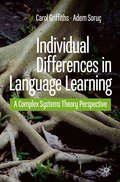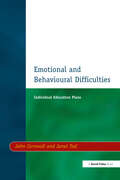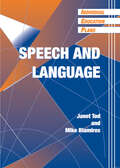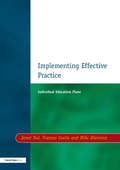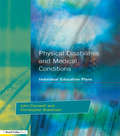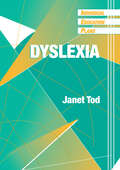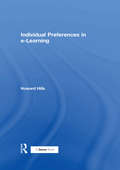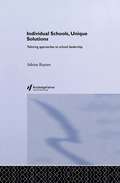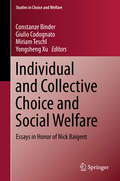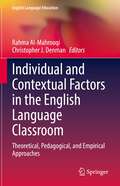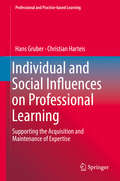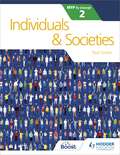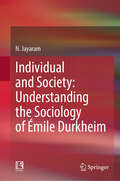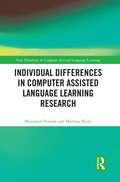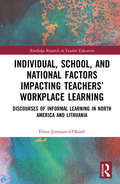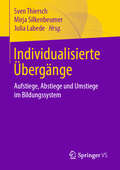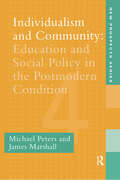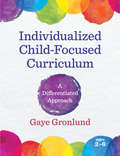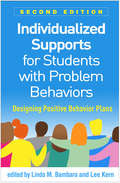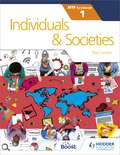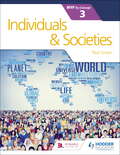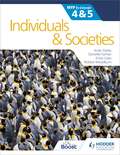- Table View
- List View
Individual Differences in Language Learning: A Complex Systems Theory Perspective
by Carol Griffiths Adem SoruçThis textbook takes a Complex Systems Theory approach to examine individual differences between learners and the potential impact of these variables on the process of acquiring a second language. The authors argue that individual variables cannot provide the complete picture, and that they must instead be understood as part of an interconnected and dynamic system of different factors in order to be useful in a language learning context. Written in an accessible style and suitable for final-year undergraduate and Masters-level students, the book includes clear definitions of key terms, discussion questions for classroom use, practical exercises and activities, and examples of real empirical studies that students and teachers can replicate in their own contexts. This textbook will be of interest to students taking TESOL and SLA courses and modules, as well as those on broader Applied Linguistics programmes.
Individual Education Plans (IEPs): Emotional and Behavioural Difficulties
by Janet Tod John CornwallFirst published in 1998. Routledge is an imprint of Taylor & Francis, an informa company.
Individual Education Plans (IEPs): Speech and Language
by Janet Tod Mike BlamiresFirst published in 1999. Routledge is an imprint of Taylor & Francis, an informa company.
Individual Education Plans Implementing Effective Practice
by Janet Tod Mike Blamires Francis CastleFirst Published in 1998. Routledge is an imprint of Taylor & Francis, an informa company.
Individual Education Plans Physical Disabilities and Medical Conditions (Individual Education Plans Ser.)
by John Cornwall Christopher RobertsonFirst Published in 1999. Routledge is an imprint of Taylor & Francis, an informa company.
Individual Education Plans: Dyslexia (Ieps Ser.)
by Janet Tod Mike Blamires Francis CastleFirst Published in 2000. Routledge is an imprint of Taylor & Francis, an informa company.
Individual Preferences in e-Learning
by Howard HillsTrainers and educators ask: 'What personality types do best at e-learning; who really likes e-learning?' Better that they should ask: 'How can we make e-learning more appealing to more people?' E-learning is here to stay in the same way that the Internet is here to stay. The classroom, as a mass education tool, was an invention of the industrial age and we have made good use of it. E-learning is an invention of the information age but we have yet to properly realise its potential. Some of the steam has gone out of e-learning. Organizations have experienced problems with technology, variable content, poor course take-up and even greater drop-out. The problem is that what appeals to the organization, a mass training and development medium that can be used to train everyone at once, is at odds with - or at least ignorant of - the learning needs of the individual. Individual Preferences in e-Learning focuses on the process of e-learning, with the emphasis on learning and individual differences. With a firm rooting in previous research, in particular the author's in-depth knowledge of the MBTIâ„¢ functions, this book shows you how to make e-learning work for different personality types.
Individual Schools, Unique Solutions: Tailoring Approaches to School Leadership
by Adrian RaynorEffective school leadership depends on developing an understanding of people, organisational learning and organisational processes. However, each school has a unique set of circumstances. Prescriptions for leadership that apply to one school may well not apply to another. Individual Schools, Unique Solutions turns away from the highly prescriptive management practices that often fail to provide a workable solution to specific problems in schools. Adrian Raynor demonstrates that by understanding the process influencing any situation, a creative solution can be achieved. The book draws on systems theory and aspects of complexity theory. While addressing many of the issues commonly faced by headteachers, the principles described are equally important for all levels of school management and the book will be of interest to all those in management positions in schools. Ultimately, this book is about developing effective leadership through understanding and is a guide to thinking afresh rather than looking for another quick-fix prescription.
Individual and Collective Choice and Social Welfare
by Constanze Binder Giulio Codognato Miriam Teschl Yongsheng XuThe papers in this volume explore various issues relating to theories of individual and collective choice, and theories of social welfare. The topics include individual and collective rationality, motivation and intention in economics, coercion, public goods, climate change, and voting theory. The book offers an excellent overview over latest research in these fields.
Individual and Contextual Factors in the English Language Classroom: Theoretical, Pedagogical, and Empirical Approaches (English Language Education #24)
by Rahma Al-Mahrooqi Christopher J. DenmanThis edited volume examines a number of topics related to the roles of individual and contextual factors in English as second or foreign language (ESL/EFL) settings by presenting chapters across the three sections of theoretical and pedagogical approaches, teacher and learner research, and research into the roles of technology. The book has a focus on practical actions and recommendations related to individual and contextual factors in ESL/EFL, with a specific concern with issues of cognition, metacognition, emotion, and identity, and offers perspectives from a diverse range of international education settings. For teachers of ESL/EFL, the effective recognition and integration of individual and contextual factors into the classroom may represent a significant challenge. This is often the case in those settings where native English speaking teachers work in foreign language contexts where they may have limited understanding of local cultures and languages, or where language instructors have class groups that are culturally and linguistically diverse. In these, and similar, contexts, the types and extent of individual and contextual factors impacting on language learning may challenge both learner and instructor expectations of what an effective and supportive classroom is. While such a situation offers numerous opportunities for learners and teachers to expand their knowledge of themselves and each other, it also presents the possibility for ineffective teaching and learning to occur. It is within this framework that the book presents the latest theoretical, pedagogical, and research perspectives from around the world, thereby providing a resource for all stakeholders with an interest in the roles individual and contextual factors play in the English learning process.
Individual and Social Influences on Professional Learning: Supporting the Acquisition and Maintenance of Expertise (Professional and Practice-based Learning #24)
by Christian Harteis Hans GruberThis book examines professional learning and relates it to the acquisition of expertise, and the influence of individuals. Professional learning, as discussed in the book, comprises all kinds of occupational domains because employment and paid work usually follow the achievement principle, i.e. workers are expected to perform efficiently. The book suggests that the perspective of expertise research is an appropriate lens to use for gaining insight in how individuals can be prepared and enabled to autonomously master the requirements of daily working life. Expertise is understood as the capacity to reliably perform on an extraordinary level, and the basic assumption is that experts are best prepared to successfully cope with future challenges at workplaces. The book comprehensively discusses issues of expertise research and explores the nature of a successful individual and an impeded individual. It proposes an integrated model of individual and social components of expertise development, the i-PPP model. The model provides insight in and an understanding of how individuals can be enabled to develop and maintain professional expertise in the context of daily work. Across all paradigms, researchers, policy-makers, employers and trade unionists agree that working conditions undergo permanent change through economic, societal, and technological developments. Recently, the digitalisation of (working) life became a hot topic of scientific and societal discourses. Workplaces, thus, provide challenges for individuals who have to be able to cope with workplace changes. Accordingly, new challenges emerge for an adequate understanding of learning for work as well as learning during work.
Individual and Societies for the IB MYP 2
by Paul GraceDevelop your skills to become an inquiring learner; ensure you navigate the MYP framework with confidence using a concept-driven and assessment-focused approach to Individuals and Societies presented in global contexts.- Develop conceptual understanding with key MYP concepts and related concepts at the heart of each chapter.- Learn by asking questions with a statement of inquiry in each chapter. - Prepare for every aspect of assessment using support and tasks designed by experienced educators.- Understand how to extend your learning through research projects and interdisciplinary opportunities.
Individual and Societies for the IB MYP 2
by Paul GraceDevelop your skills to become an inquiring learner; ensure you navigate the MYP framework with confidence using a concept-driven and assessment-focused approach to Individuals and Societies presented in global contexts.- Develop conceptual understanding with key MYP concepts and related concepts at the heart of each chapter.- Learn by asking questions with a statement of inquiry in each chapter. - Prepare for every aspect of assessment using support and tasks designed by experienced educators.- Understand how to extend your learning through research projects and interdisciplinary opportunities.
Individual and Society: Understanding the Sociology of Émile Durkheim
by N. JayaramThis comprehensive volume explores the foundational contributions of the eminent French sociologist Emile Durkheim. It delves into his writings in political sociology and the sociology of education. It discusses the seminal contributions of Emile Durkheim to the development of sociology as a positivist social science. It offers an in-depth analysis of Durkheim's methodological rules for studying 'social facts,' exploring critical topics like the division of labor, education, political society, state, religion, secular morality, socialism, and suicide. Chapter by chapter, the book unfolds Durkheim's life and milieu, providing insights into the background and context that fueled his conceptualization of sociology and the creation of his seminal works. From portraying sociology as an empirical science of human society to dissecting the moral basis of social order and delving into the pathology of suicides, it navigates Durkheim's multifaceted contributions. The book explores Durkheim's groundbreaking analyses of the interplay between society, religion, politics, and education. It highlights his pioneering contributions to the subdisciplines of the sociology of religion, political sociology, and the sociology of education. It underscores the contemporary relevance of Durkheim's sociological legacy. This book is highly relevant for postgraduate students and researchers in sociology, social anthropology, and social sciences in understanding Emile Durkheim's work in sociology.
Individual differences in Computer Assisted Language Learning Research (New Directions in Computer Assisted Language Learning)
by Mariusz Kruk Miroslaw PawlakThis book syntheses cutting-edge research on the role of individual differences (IDs) in the field of SLA and in computer assisted language learning. It also outlines the theoretical and methodological issues at the heart of this research, presents empirical findings and charts future directions of this research. Pawlak and Kruk provide an overview of the latest theoretical developments in research on IDs in SLA as well as methodological considerations that are crucial when researching individual variation, with special emphasis on data-collection procedures that are most prominent in CALL. The book goes on to summarize and explore a body of empirical evidence concerning the role of individual difference factors in CALL, singling out existing gaps, methodological problems, and areas in need of further investigation. Finally, the authors provide a guide on how empirical investigations of individual difference factors in CALL can be improved by incorporating latest developments from the broader field of SLA. This book will be of great interest to postgraduates and scholars in the domain of applied linguistics and second language education who are interested in CALL, as well as those studying and undertaking research in second language learning and teaching.
Individual, School, and National Factors Impacting Teachers’ Workplace Learning: Discourses of Informal Learning in North America and Lithuania (Routledge Research in Teacher Education)
by Elena Jurasaite-O’KeefeBy drawing on observation and detailed discourse analysis from interviews with teachers in Lithuanian and North American schools, this text identifies individual, school-specific, and national factors which impact teachers’ informal professional learning. Addressing multiple layers of teacher learning, this text illustrates how factors including socio-economic status, individual learning style, cultural attitudes to education, and political histories support or impede workplace learning. Drawing on three fields of research—teacher education, cultural anthropology, and comparative international—the book posits teacher learning as a multidimensional socio-cultural process. Finally combining a typology of informal learners with other policy-driven factors, the text indicates how practices at school, district, and national levels might stimulate workplace learning. Offering methodological innovations including unique research design and creative ways of using discourse analysis, this book will be of particular use to researchers and doctoral students in education, organizational and educational psychology, cultural anthropology, management, and beyond.
Individualisierte Übergänge: Aufstiege, Abstiege und Umstiege im Bildungssystem
by Julia Labede Sven Thiersch Mirja SilkenbeumerDer vorliegende Band widmet sich der Frage, wie Auf-, Ab- und Umstiege im Bildungssystem organisiert sind, in verschiedenen Entwicklungsphasen und Sozialisationsräumen zustande kommen und von den Akteuren gedeutet werden. Diese Bildungsverläufe sind erst ansatzweise erforscht und diskutiert worden. In der Schul- und Bildungsforschung orientiert man sich nach wie vor stark an Normal(bildungs)laufbahnen und fokussiert die institutionell normierten Übergänge, um Bildungsbeteiligung, Bildungserfolg und soziale Bildungsungleichheiten zu untersuchen. Die Beiträge dieses Buches stellen demgegenüber unterschiedliche Theoriepositionen und aktuelle Ergebnisse zu den Dynamiken und Prozessen der Aneignung und Bewältigung individualisierter Übergänge dar. In diesem Zusammenhang werden Herausforderungen für die Bildungsforschung und Fragen zur pädagogischen Gestaltung dieser Übergangsformen formuliert.
Individualism And Community: Education And Social Policy In The Postmodern Condition (New Prospects Ser. #No.4)
by James Marshall Michael PetersExamining, in the widest sense, the changes in political philosophy that have occurred in Western capitalist states since the early 1980s, this book focuses on the introduction of neo-liberal principles in the combined area of social and education policy. New Zealand presents a paradigm example of the neo-liberal shift in political philosophy. From constituting the social laboratory of the Western world in the 1930s in terms of social welfare provision, New Zealand has become the neo-liberal experiment of the fully marketised society in the 1990s. Against the theoretical background of educational theory and practice, this book examines neo-liberalism and its critiques as responses to the so-called crisis of the welfare state and argues for a reformulated critical social policy in the postmodern condition. The conclusions about social policy drawn by the authors can be generalized to similar situations in other Western capitalist countries.
Individualized Child-Focused Curriculum: A Differentiated Approach
by Gaye GronlundLearn to integrate individualized curriculum into daily practice with this step-by-step guide. Using Developmental Studies, a new tool created and successfully field-tested by the author, implement a truly child-focused and individualizing curriculum, meeting each child where she or he is and ultimately making teaching easier and more rewarding. These user-friendly materials will help teachers reconnect and reengage with each student outside of all the standards that are required.
Individualized Supports for Students with Problem Behaviors, Second Edition: Designing Positive Behavior Plans (The\guilford School Practitioner Ser.)
by Linda M. Bambara Lee KernNoted for providing everything needed to develop individualized positive behavior support (PBS) plans for students with pervasive behavioral challenges, this authoritative guide has been revised and expanded to reflect 15 years of changes in the field. The book walks practitioners through the PBS process, emphasizing a team-based approach and presenting assessment procedures, intervention strategies, and guiding questions. Detailed case examples illustrate ways to meet the diverse needs of students across abilities, grade levels (PreK–12), and problem behaviors. In a convenient large-size format, the book follows the sequence of a typical PBS course, making it ideal for use in teaching and training. New to This Edition *Incorporates current tools and practices within an expanded, whole-school PBS approach. *Chapters on multi-tiered systems of support and the fundamentals of classroom management. *Chapter on writing, monitoring, and evaluating a complete PBS plan. *Two extended case examples that run through many of the chapters. *&“Commentaries from the Field&” in which leading experts reflect on the contributions, challenges, and future directions of PBS.
Individuals and Societies for the IB MYP 1: by Concept
by Paul GraceExam Board: IBLevel: MYPSubject: Social ScienceFirst Teaching: September 2016First Exam: June 2017Develop your skills to become an inquiring learner; ensure you navigate the MYP framework with confidence using a concept-driven and assessment-focused approach to Individuals and Societies presented in global contexts.- Develop conceptual understanding with key MYP concepts and related concepts at the heart of each chapter.- Learn by asking questions with a statement of inquiry in each chapter. - Prepare for every aspect of assessment using support and tasks designed by experienced educators.- Understand how to extend your learning through research projects and interdisciplinary opportunities.
Individuals and Societies for the IB MYP 1: by Concept
by Paul GraceExam Board: IBLevel: MYPSubject: Social ScienceFirst Teaching: September 2016First Exam: June 2017Develop your skills to become an inquiring learner; ensure you navigate the MYP framework with confidence using a concept-driven and assessment-focused approach to Individuals and Societies presented in global contexts.- Develop conceptual understanding with key MYP concepts and related concepts at the heart of each chapter.- Learn by asking questions with a statement of inquiry in each chapter. - Prepare for every aspect of assessment using support and tasks designed by experienced educators.- Understand how to extend your learning through research projects and interdisciplinary opportunities.
Individuals and Societies for the IB MYP 3
by Paul GraceA concept-driven and assessment-focused approach to Individual and societies teaching and learning.- Approaches each chapter with statements of inquiry framed by key and related concepts, set in a global context- Supports every aspect of assessment using tasks designed by an experienced MYP educator- Differentiates and extends learning with research projects and interdisciplinary opportunities- Applies global contexts in meaningful ways to offer an MYP Individual and societies programme with an internationally-minded perspective
Individuals and Societies for the IB MYP 3
by Paul GraceA concept-driven and assessment-focused approach to Individual and societies teaching and learning.- Approaches each chapter with statements of inquiry framed by key and related concepts, set in a global context- Supports every aspect of assessment using tasks designed by an experienced MYP educator- Differentiates and extends learning with research projects and interdisciplinary opportunities- Applies global contexts in meaningful ways to offer an MYP Individual and societies programme with an internationally-minded perspective
Individuals and Societies for the IB MYP 4&5: MYP by Concept
by Danielle Farmer Emily Giles Kenneth A Dailey Robbie WoodburnDevelop your skills to become an inquiring learner; ensure you navigate the MYP framework with confidence using a concept-driven and assessment-focused approach to Individuals and societies, presented in global contexts.· Develop conceptual understanding with key MYP concepts and related concepts at the heart of each chapter. · Learn by asking questions for a statement of inquiry in each chapter. · Prepare for every aspect of assessment using support and tasks designed by experienced educators.· Understand how to extend your learning through research projects and interdisciplinary opportunities.· Think internationally with chapters and concepts set in global contexts.
